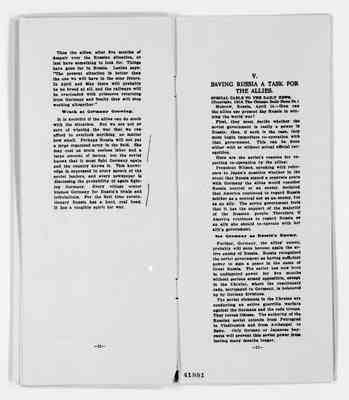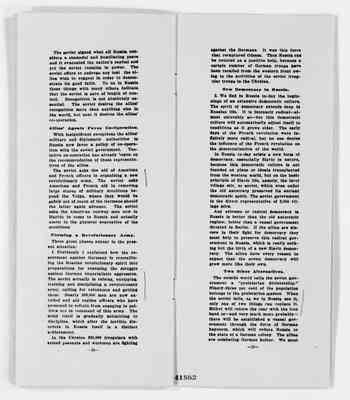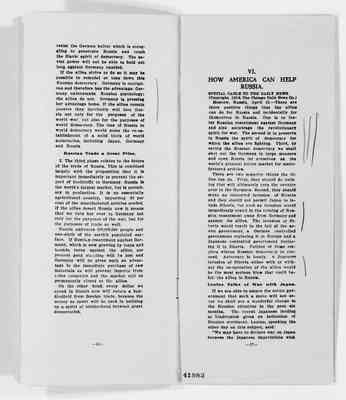Pages
36
[left page]
Thus the allies, after five months of despair over the Russian situation, at last have something to look for. Things have gone far in Russia. Lenine says: "The Present situation is better than the one we will have in the near future. In April and May there will probably be no bread at all, and the railways will be overloaded with prisoners returning from Germany and finally they will stop working altogether."
Wrath at Germany Growing.
It is doubtful if the allies can do much with the situation. But we are not so sure of winning the war that we can afford to overlook anything, no matter how small. Perhaps Russia will not put a large organized army in the field. She may cost us much useless labor and a large amount of money, but the soviet knows that it must fight Germany again and the country knows it. This knowledge is expressed in every speach of the soviet leaders, and every newspaper is discussing the probability of again fighting Germany. Every village orator blames Germany for Russia's trials and tribulations. For the first time revolutionary Russia has a hard, real bond. It has a tangible spirit for war.
[/left page]
[right page]
V. SAVING RUSSIA A TASK FOR THE ALLIES.
SPECIAL CABLE TO THE DAILY NEWS. [Copyright, 1918. The Chicago Daily News Co.]
Moscow, Russia, April 14.—How can the allies use present bay Russia in winning the world war?
First, they must decide whether soviet government is really a power in Russia; then, if such is the case, they must begin immediate co-operation with that government. This can be done either with or without actual official recognition.
Here are the soviet's reasons for expecting co-operation by the allies:
President Wilson, speaking with reference to Japan's question whether in the event that Russia signed a separate peace with Germany the allies would consider Russia neutral or an enemy, declare that America continued to regard Russia neither as a neutral nor as an enemy, but as an ally. The soviet government feels that it has the support of the majority of the Russian people. Therefore, if America continues to regard Russia as an ally she should co-operate with her ally's government.
See Germany as Russia's Enemy.
Further, Germany, the allies' enemy probably will soon become again the active enemy of Russia. Russia recognized the soviet government as having sufficient power to sign a peace in the name of Great Russia. The soviet has now been in undisputed power for five months without serious armed opposition, except in the Ukraine, where the reactionary rada, mortgaged to Germany, is bolstered up by German divisions
The soviet elements in the Ukraine are conducting an active guerrilla warfare against the Germans and the rada troops. They retook Odessa. The authority of the Russian soviet extends from Petrograd to Vladivostok and from Archangel to Baku. Only German or Japanese bayonets will prevent this soviet power from lasting many months longer.
—23—
41881 [/right page]
37
[left page]
The soviet signed what all Russia considers a shameful and humiliating peace and it evacuated the nation's capital and yet the soviet remains in power. The soviet offers to undergo any test the allies wish to suggest in order to demonstrate its good faith. To us in Russia these things with many others indicate that the soviet is sure of length of control. Recognition is not absolutely essential. The soviet desires the allies' recognition more than anything else in the world, but next it desires the allies' co-operation.
Allies' Agents Favor Co-Operation.
With insignificant exception the allies' military and diplomatic authories in Russia now favor a policy of co-operation with the soviet government. Tentative co-operation has already begun on the recommendation of these representatives of the allies.
The soviet asks the aid of American and French officers in organizing a new revolutionary army. The soviet asks American and French aid in removing large stores of military munitions beyond the Volga, where they would be safely out of reach of the Germans should the latter again advance. The soviet asks the American railway men now in Harbin to come to Russia and actually assist in the physical evacuation of the munitions.
Forming a Revolutionary Army.
Three great phases appear in the present situation:
1. Previously I explained how the resentment against Germany is crystallizing the Russian revolutionary spirit into preparations for resuming the struggle against German imperialistic aggression. The soviet actually is raising, equipping, training and disciplining a revolutionary army, calling for volunteers and getting them. Nearly 300,000 men are now enrolled and old regime officers who have promised to refrain from engaging in politics are in command of this army. The army itself is gradually submitting to discipline, which after the terrible disorders in Russia itself is a distinct achievement.
In the Ukraine 200,000 irregulars with armed peasants and workmen are fighting
—21— [/left page]
[right page]
against the Germans. It was this force that recaptured Odessa. Thus Russia can be counted as a positive help, because a certain number of German troops have been recalled from the western front owing to the activities of the soviet irregular troops in the Ukraine.
New Democracy in Russia.
2. We find in Russia to-day the beginings of an extensive democratic culture. The spirit of democracy extends deep in Russian life. It is intensely radical—almost unlovably so—but this democratic culture will automatically adjust itself to conditions as it grows older. The early days of the French revolution were infinately more radical, but no one denies the influence of the French revolution on the democratization of the world.
In Russia to-day exists a new form of democracy, essentially Stavic in nature, because this democratic culture is not founded on plans or ideals transplanted from the western world, but on the basic principle of Slavic life, namely, the local village mir, or soviet, which even under the old autocracy preserved its ancient democratic spirit. The soviet government is the direct representative of 2,000 village mirs.
Any extreme or radical democracy in Russia is better than the old autocratic regime; better than a vassal government dictated in Berlin. If the allies are sincere in their fight for democracy they must help to preserve this radical government in Russia, which is really nothing but the birth of a new Slavic demoracy. The allies have every reason to expect that the soviet democracy will grow more like their own.
Two Other Alternatives.
The outside world calls the soviet government a "proletarian dictatorship." Ninety-three per cent of the population belongs to the proletarian masses. When the soviet falls, as we in Russia see it, only one of two things can replace it. Either will return the czar with the iron hand or—and very much more probably— there will be established a vassal government through the force of German bayonets, which will reduce Russia to the state of a German colony. The allies are combating German kultur. We must
—25—
41882 [/right page]
38
left page]
resist the German kultur which is struggling to penetrate Russia and crush the Stavic spirit of democracy. The soviet power will not be able to hold out long against Germany unaided.
If the allies strive to do so it may be possible to remodel or tone down this Russian democracy. Germany is contiguous and therefore has the advantage. Germany understands Russian psychology the allies do not. Germany is pressing her advantage home. If the allies remain passive they inevitably will lose Russia not only for the purposes of the world war, but also for the purposes of world democracy. The loss of Russia to world democracy would mean the re-establishment of a solid block of world autocracies, including Japan, Germany and Russia.
Russian Trade a Great Prize.
3. The third phase relates to the future of the trade of Russia. This is combined largely with the proposition that it is important immediately to prevent the export of foodstufls to Germany. Russia is the world's largest market, but is secondary in production. It is an essentially agricultural country, importing 90 per cent of the manufactured articles needed. If the allies desert Russia now it means that we turn her over to Germany not only for the purposes of the war, but for the purposes of trade as well.
Russia embraces 180,000,000 people and one-sixth of the earth's populated surface. If Russian resentment against Germany, which is now growing by leaps and bounds, turns against the allies, our present good standing will be lost and Germany will be given such an advantage in the immediate purchase of raw materials as will prevent imports from other countries and the market will be permanently closed to the allies.
On the other hand, every dollar we spend in Russia now will return a hundredfold from foreign trade, because the money so spent will be used in building up a spirit of brotherhood between great democracies.
—26— [/left page]
[right page]
HOW AMERICA CAN HELP RUSSIA.
SPECIAL CABLE TO THE DAILY NEWS. [Copyright, 1918, The Chicago Daily News Co.]
Moscow, Russia, April 15.—There are three positive things that the allies can do for Russia and incidentally for themselves in Russia. One is to foster Russian resentment against Germany and also encourage the revolutionary spirit for war. The second is to preserve in Russia the spirit of democracy for which the allies are fighting. Third, by saving the Russian democracy we shall shut out the Germans in a large measure and open Russia for ourselves as the world's greates future market for manufactured articles.
There are two negative things the allies can do. First, they should do nothing that wil ultimately turn the country over to the Germans. Second, they should make no concerted invasion of Siberia and they should not permit Japan to invade Sibertia, for such an invasion would immediately result in the turning of Russian resentment away from Germany and against the allies. The invasion of Siberia would result in the fall of the soviet government, a German controlled government replacing it in Europe and a Japanese controlled government replacing it in Siberia. Neither of these empires wishes Russian democracy to succeed. Autocracy is lonely. A Japanese invasion of Siberia either with or without the co-operation of the allies would be the most serious blow that could befall the allies in Russia.
Lenine Talks of War with Japan.
If we are able to assure the soviet government that such a move will not occur we shall see a wonderful change in the Russian situation in the next six months. The recent Japanese landing at Vladivostok gives an indication of Russian sentiment. Lenine, speaking the other day on this subject, said:
"We may have to declare war on Japan because the Japanese imperialists which
—27—
41883
[right page]
39
to annex sections of free democratic Siberia. Serious complications with England and France would be probable and it may result in war should they, as allies of Japan, be unable to restrain her spoliation of Siberia."
Leon Trotiky says openly that Japan and Germany have reached an agreement, although, in view of Germany's attitude in the far east, that sounds improbable. Nevertheless, the soviet leaders declare that they intend to fight Japan should she continue the movement toward Siberia. They insist Japan has searched for numerous pretexts for an invasion of Siberia and the occupation of Vladivostok and the Siberian littoral.
German Prisoners Not Arming.
can set ofl out of the ground for the
There were rumors for a time that German War prisoners in Siberia were arming themselves with the object of seizing the Trans-Siberian rallroad. This was disproved by a special American and British committee of investigation. During the German drive on the western front the Japanese suggested that an invasion of Siberia might cause a diversion of German troops from that front. Any sane military judgment would disprove this theory, yet the Franco-British general stats requested Gen. Pershing to use his infiuence in Washington to bring about the plan suggested.
When Japan shall invade Siberia here is what will happen in Russia:
First, the soviet will declare war on Japan and send against that country all available troops that are now preparing to fight against Germany.
Second, it will recall all the soviet troops now fighting a guerrilla warfare gainst Germany in the Ukraine and will send them to Siberia to fight against the Japanese. Such action will injure the western front, because the 200,000 soviet irregulars in the Ukraine are now detaining a certain number of German troops.
Third, the soviet will immediately appeal to Germany to aid Russia in fighting Japan, because, although Russian resentment against Germany is now growing by leaps and bounds, there exists a ready made resentment against Japan. That is the reason why Germany wants
—28—
[left page]
[right page]
Japan to invade Siberia. This would forestall the future conflict of Germany with the new revolutionary army and would turn a political enemy of Germany into a certain ally.
How America May Co-Operate.
If America decides to give strong cooperation with the soviet forces, here is an immediate program that may be suggested:
1. Send American army officers of every branch of the military service numbering from forty to 200 for the purpose of helping to organize the new revolutionary army and advising its leaders regarding stratagy.
2. Send five to ten oil experts—men who can get oil out of the ground—for the purpose of taking part of the reorganization of the Baku oil field.
3. Send five to ten coal experts to get coal out of the ground in the Donetz basin.
4. Send a comission on other natural industries like iron into the Urals, and so on.
5. Send a finance committee to aid the soviet in solving the Russian financial muddle, ignoring for the time being the repudiation of debts, which, I believe, will not be permanent. Our legal position regarding the repudiation is secure through the allied protest concerning it.
Buy Up Russian Products.
6. Send an industrial comission for the purpose of purchasing articles in Russia and shipping them to America, so as to prevent these articles from going to Germany. This will be in the nature of an extended blockade. Russia will exchange raw materials, such as flax, platinum, hides, and so on, on the basis of barter.
7. Appoint a comission in America for the purpose of arranging tonnage and selecting certain supplies and American manufactured articles, choosing those which Russia needs most and sending them to the Russian ports of Vladivostok, Archangel and Murmonsk. In the same bottoms that bring the manufactured articles remove raw materials of equal value that would go to England.
8. establish immediate credits in America for the purpose of purchasing manu-
—29—
41887
[/right page]
40
[left page]
factured articles intended for Russia, which would be exchanged for an equal value in raw materials on reaching Russian port.
9. Prevent immediately the available natural resources of Russia from going to Germany through taking them ourselves and sending back to Russia just sufficient manufactured articles to pay for them. Thus Russia's debt to the allies will not be increased, while Germany will be deprived of large quantities of needed war material.
Hundred Americans on the Way.
Some allied co-operation has already been started. To-day there are five allied military missions working that are close in the confidence of Trotzky and other leaders engaged in organizing the new revolutionary army. One hundred American railway operators are traversing Manchuria on their way to help the soviet actually to evacuate munitions from Petrograd to points beyond the Volga and out of reach of the Germans should they again advance. The soviet is showing extreme willingness to place the munitions beyond the reach of the Germans. This of itself should be evidence of its good faith.
Here is a general summary of the situation: The bolsheviki used socialist formulas for the purpose of obtaining control of the soviet's organization and ousting Kerensky. The soviet power is permanent, unless it is deposed by German or Japanese imperialistic force. The soviet government to-day is not socialistic. Neither is it a proletariat dictatorship, because the soviet government is founded on the power of the soviet organization, which, in turn, is founded on a Slav basis, the principle of which is democracy or the village mir.
Ninety-three per cent of the people belong to the proletariat or the peasant masses. The other 7 per cent are monarchists, nobles, capitalists and landowners. These are the ones who complain of a proletariat dictatorship.
Russian Democrncy Will Not Die.
Russia is rather suffering from birth pains than death throes. The soviet is championing a new form of democracy. While essentially different from the
—30—
[/left page]
[right page]
Anglo-Saxon idea. It is a real democracy nevertheless, which, with the passage of time, will certainly spread into Slavic Austria. Democracy is the idea underlying the allies' struggle. The Russian soviet's democracy will never die, regardless of the allied attitude. The country is strong for freedom, but unless the allies support it perhaps Germany or Japan will succeed either in stifling or rifling it.
Democratic Russia is getting angry at Germany for the first time since the war began. The Russians now feel Germany as an individual menace; previously they thought Germany menaced only the czar.
The western world does not seem to understand Japan's landing at Vladivostok. Japan's movement toward Siberia threatens to turn Russian resentment from Germany to Japan and Japan's allies, because the allies are unable to check Japan.
Situation Better for the Allies.
The Russian situation is better for the allies to-day than at any other time since the revolution began. There are potentialities that will materially aid us to win the world war. Had we known Russian psychology or spent as much time studying Russia as Germany spent we should have understood. We were like the boy testing the water with his big toe, hesitating to take the plunge.
Let us get aboard. Let us play our ally's government for better or for worse, lest Germany beat us to it!
—31—
41885
[right page]




